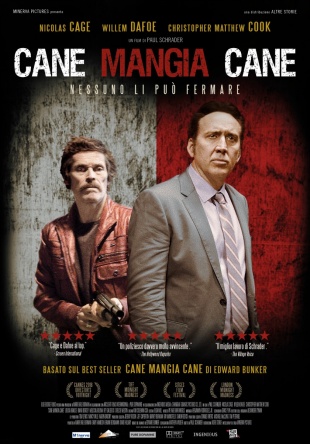|
|
CANE MANGIA CANE
69. Festival del Cinema di Cannes (11-22 Maggio 2016) - Film di chiusura della sezione 'Quinzaine des realisateurs' - PREVIEW in ENGLISH by PETER DEBRUGE (www.variety.com) - Dal 13 Luglio
(Dog Eat Dog; USA 2016; Action Thriller; 95'; Produz.: Blue Budgie Films Limited/Pure Dopamine; Distribuz.: Microcinema per Minerva Pictures)
 See SYNOPSIS
See SYNOPSIS
|
Titolo in italiano: Cane mangia cane
Titolo in lingua originale:
Dog Eat Dog
Anno di produzione:
2016
Anno di uscita:
2017
Regia: Paul Schrader
Sceneggiatura:
Paul Schrader e Matthew Wilder
Soggetto: Il film si ispira al romanzo omonimo di Edward Bunker, campione di vendite in tutto il mondo.
Cast: Nicolas Cage (Troy)
Willem Dafoe (Mad Dog)
Louisa Krause
Paul Schrader (Grecco The Greek)
Melissa Bolona (Lina)
Magi Avila (Nanny Carmen)
Kayla Perkins
Reynaldo Gallegos (Chepe)
Logan Fry (Ten Dollar Tipper)
John Patrick Jordan (Jack Cates)
Omar J. Dorsey (Moon Man)
Chelsea Mee (Madeleine)
Jessica Sonneborn (giudice)
Christopher Matthew Cook (Diesel)
Tevis R. Marcum (White Power Inmate)
Costumi: Olga Mill
Scenografia: Grace Yun
Fotografia: Alexander Dynan
Montaggio: Ben Rodriguez Jr.
Makeup: Francesca Tampieri (direttrice), Lauren Thomas (per Nicolas Cage)
Casting: Kim Coleman
Scheda film aggiornata al:
03 Agosto 2017
|
Sinossi:
Il film narra la vicenda di tre uomini molto diversi tra loro che, appena usciti dal carcere, devono riadattarsi alla vita civile. Sono Troy (Cage), che è alla ricerca di una vita semplice e lontana dal crimine, Diesel (Christopher Mattew Cook), che è sul libro nero della mafia e Mad Dog (Defoe), che animato da una vera e propria vocazione sanguinaria, è il piÚ folle e criminale. I tre si trovano immischiati in un rapimento importante: è l'ultimo colpo, quello definitivo. Ma le cose non vanno come devono andare e si ritrovano di nuovo in fuga tra sparatorie, violenze e suspence, per evitare la prigione e ricostruire le loro vite.
SYNOPSIS:
Carved from a lifetime of experience that runs the gamut from incarceration to liberation, Dog Eat Dog is the story of three men who are all out of prison and now have the task of adapting themselves to civilian life. The California three strikes law looms over them, but what the hell, they're going to do it, and they're going to do it their way. Troy, an aloof mastermind, seeks an uncomplicated, clean life but cannot get away from his hatred for the system. Diesel is on the mob's payroll and his interest in his suburban home and his nagging wife is waning. The loose cannon of the trio, Mad Dog, is possessed by true demons within, which lead him from one situation to the next. One more hit, one more jackpot, and they'll all be satisfied. Troy constructs the perfect crime and they pull it off, but in the aftermath, they keep finding the law surrounding them wherever they go.
Commento critico (a cura di PETER DEBRUGE, www.variety.com)
|
 Paul Schrader seems so intent on ignoring overused genre-movie conventions that he ignores what would have made this pulp crimer effective.
Paul Schrader seems so intent on ignoring overused genre-movie conventions that he ignores what would have made this pulp crimer effective.
They say prostitution is the worldâs oldest profession, but thatâs only because crime doesnât pay, or else robbers, murderers and thieves would surely come first. Their exploits have been the stuff of cinema since the mediumâs earliest days, to the extent that the crime genre has become all but calcified â which surely explains why director Paul Schrader goes so far out of his way to break all the rules with âDog Eat Dog.â Coming off the indignity of having âDying of the Lightâ taken away from him, the âTaxi Driverâ screenwriter-turned-director seems determined to try out some new tricks. He means for the result to feel fresh and electric, but instead, his anarchic approach (one could even call it âcriminal,â considering how it deliberately disobeys genre laws) |
|
frequently verges on incompetent, as most of the time, rejecting the obvious choice leads to choosing a worse one.
Had the experiment worked, âDog Eat Dogâ might have been the next âNatural Born Killersâ â a cracked-out postmodern romp whose delinquent antiheroes see themselves as the stars of the ultimate bandits-on-the-run movie. Adapted from a novel from a real-life criminal, Edward Bunker, the film begins with a guy named Mad Dog (Willem Dafoe) watching television and ends with ex-con pal Tony (Nicolas Cage) playing Humphrey Bogart in his own hail-of-gunfire âBonnie and Clydeâ-style ending. In between, they enlist another friend they met in the slammer, Diesel (Christopher Matthew Cook), to assist with what should be a relatively straightforward kidnapping.
Theyâre supposed to steal a baby from a guy named Brennan whoâs been holding out millions from a local Cleveland crime boss. But Mad Dog has an itchy trigger finger (âLet me waste |
|
a couple,â he begs during an earlier hold-up), and some goonâs brains end up splattered all over the babyâs nursery. The movie never even bothers to reveal what becomes of the baby, which may or may not be screenwriter Matthew Wilderâs fault, since Schrader seemed to approach it as little more than the framework on which the cast and crew (nearly all of them hungry young talents a bit too eager to prove themselves) might improvise.
Following the filmâs closing-night premiere in Directorsâ Fortnight at the Cannes Film Festival, Schrader explained his strategy: âDonât be boring.â But that doesnât really qualify as a valid piece of direction. In fact, itâs practically the opposite, allowing a certain kind of creative anarchy to hijack the proceedings â which otherwise feel like a quarter-century-late Scorsese or Tarantino rip-off. Consider the vaguely pop-culture conversation set in the front of Moon Manâs sedan, in which the |
|
drug dealer gripes about how his lazy girlfriend has let her BeyoncĂŠ curves go, essentially time before the trio (hilariously disguised as Clevelandâs least convincing cops in one of the filmâs better gags) pull him over. He may as well be debating the implications of a foot massage, a la âPulp Fiction,â only the dialogue isnât nearly as interesting, and even with the police car visible through the rear window, the suspense is practically non-existent.
Thatâs not to say âDog Eat Dogâ is bereft of interesting choices. Far from it, though its infrequent bursts of gonzo brilliance are all in service of such an uninteresting premise. Of course things will go sour, and Tony, Diesel and Mad Dog will eventually start to betray one another, but itâs hard to feel all that invested when the characters feel so inauthentic to begin with. Basically, theyâre stereotypes on whom Cage, Cook and Dafoe |
|
are free to doodle â the perfect example of how each eccentrically approaches his own character being a montage in which they take their earnings back to a casino-hotel and try to score with whatever women they can find.
Those hoping for another unhinged performance from Cage (a la âBad Lieutenant: Port of Callâ or âThe Rockâ) can take some pleasure in his late-movie Bogart impression, though itâs nothing compared to the drug-addled outburst Dafoe delivers in the movieâs opening scene (one that earns him his Mad Dog nickname, while displaying none of the soul he brought to Schraderâs criminally under-seen âLight Sleeperâ). In fact, that sociopathic prologue â in which Mad Dog bathes his heavyset girlfriendâs kitschy pink walls red with blood, while her bobble-head collection looks on in horror â makes it hard to ever come around to feeling for these characters, but at least it clues audiences into |
|
what kind of madness lies in store (even if nothing that follows ever comes close).
Shooting his first feature, cinematographer Alexander Dynan experiments with his widescreen compositions, often racking focus mid-shot, and using mirrors and neon to create visual interest. But the relentless attempt to never be boring can only do so much for a piece of material that rarely feels more than boilerplate.
Even the cred of working from a book by an author who was himself a criminal, and therefore knew of what he wrote, doesnât translate in film that wears its own hyper-stylized phoniness so brazenly on its sleeve. There are scenes projected in black-and-white, and others lit like they belong in a Nicolas Winding Refn movie. Like the criminals, who donât have even so much as a code among thieves to abide by, Schraderâs choices nearly all seem to be arbitrary. Instead of coming off as veterans who |
|
know what theyâre doing, the result feels dangerously amateur. |
|
|
|
|
|
|
|
|
|
|
|
|
|
|
|
|
Pressbook:
 Pressbook Completo in Italiano
Pressbook Completo in Italiano
Links:
Galleria Fotografica:
1
Fatal error: Uncaught Error: Call to undefined function str_starts_with() in /web/htdocs/www.celluloidportraits.com/home/util.php:223
Stack trace:
#0 /web/htdocs/www.celluloidportraits.com/home/schedamovie.php(775): makeLinkVideo()
#1 {main}
thrown in /web/htdocs/www.celluloidportraits.com/home/util.php on line 223
|